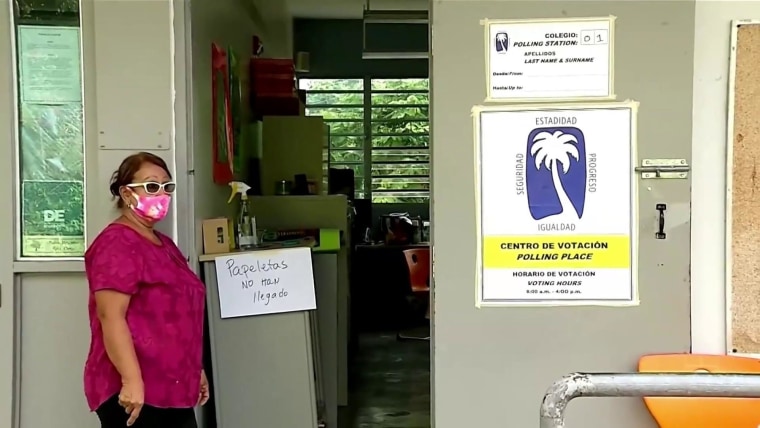Puerto Ricans like Carmen Damaris Quiñones Torres still don’t know who their nominees for governor are two days after the island held a chaotic primary election that was supposed to determine who will be on the ballot in November.
Quiñones Torres, who lives in the town of Trujillo Alto, was getting ready to vote in Puerto Rico’s primary on Sunday when she found out that her polling place had closed because it had never received any ballots. Other polling centers received ballots hours after voting was scheduled to start or ran out halfway through the primary.
These scenes were replayed across hundreds of polling centers on the island.
Quiñones Torres, with the help of Puerto Rico’s ACLU chapter, is suing the president of the island’s Elections Commission, as well as political party commissioners overseeing the primary, alleging that their decision to close down polls early as the primary was taking place on Sunday was illegal and unconstitutional.
Elections Commission President Juan Ernesto Dávila, alongside party commissioners María Santiago Rodríguez and Lind Merle Feliciano as well as other officials, are facing backlash over early poll closings. Other critics have also blasted them for letting polling places that eventually received ballots work extended hours, arguing that some voters had already left because of the delays.
Dávila told Telemundo Puerto Rico on Tuesday evening that his agency is working to reopen voting centers that did not receive ballots Sunday for a make-up primary on Aug. 16. It’s unclear what will happen with the polling places that ran out of ballots.
Mayte Bayolo-Alonso, an ACLU attorney working on the case, told NBC News there’s no “legally-biding law, resolution or ruling” allowing members of the Elections Commission, who are “unelected officials who are part of an executive agency,” to suspend or postpone a primary.
“Extend it, you can do it because you’re not limiting the right to vote, you are providing more. But they can’t restrict the date or time of an ongoing primary,” she said. “Even in the U.S., the law makes it clear that you can’t close voting polls in the middle of the election process.”
“When you do that, you cause irreparable damages,” said Bayolo-Alonso. “What we’re trying to do now is mitigate that damage and make sure that those who were left out can exercise the right to vote.”
The shoddy primary process also spurred a flurry of lawsuits from the candidates on primary ballots — including one from Gov. Wanda Vázquez, who is unelected after taking office last year when then-Gov. Ricardo Rosselló resigned amid mass protests triggered by a political scandal. Her primary opponent Pedro Pierluisi, who like Vázquez is from the pro-statehood New Progressive Party, is also suing as well as opposition party candidates Eduardo Bhatia and Carlos Delgado.
Download the NBC News app for breaking news and politics
Carlos Méndez, president of the island’s House of Representatives, and other officials are urging the commission to release the results of the roughly 60 out of 110 precincts where voting took place in an effort to be transparent. Others are asking the commission to hold up on releasing the results, arguing it could influence how people vote in the make-up election.
On Wednesday morning, the Puerto Rican Supreme Court issued an order to paralyze the “count, scrutiny and disclosure of votes cast in the primaries last Sunday” until the case is resolved.
The ballots of those who voted are in “locked cages” at a stadium serving as the Elections Commission’s operations center. They’re being guarded by police and representatives from candidates running for office, according to Dávila.
Suppressing usually high turnout?
Bayolo-Alonso said she saw many red flags before the primaries after the Puerto Rican government approved a new electoral code in June amid the coronavirus pandemic — changing election rules about 130 days before the island’s Nov. 3 general election.
This meant that Puerto Rican voters — known for often having a 70 percent voter participation rate or more — had a limited amount of time to learn what counts as a valid vote, and agencies overseeing the electoral process had to work against the clock to abide by the new set of rules.
“Even by the time the new electoral code was approved, the Elections Commission was set up to fail,” said Bayolo-Alonso in Spanish. The new code requires ballots to be printed 75 days before an election, but that new rule was imposed on June 20, two weeks before Sunday’s primary. “So since its approval, there were already breaches,” she said.
Amid coronavirus concerns, Puerto Ricans who live on the island can only participate in a primary if they vote in person, according to the new electoral code. “And that option was restricted by a shoddy process,” Bayolo-Alonso said.
On top of this, Puerto Rico’s coronavirus lockdown prohibited new voters from registering for 95 days. New voters in Puerto Rico can only register in person. “That’s also a kind of voter suppression,” said Bayolo-Alonso.
Now it’s up to the Puerto Rican Supreme Court to lay out a legal framework that ensures that the electoral process does not unravel during the general election in November.
The Puerto Rican Supreme Court is expected to rule on the case sometime this week.
Follow NBC Latino on Facebook, Twitter and Instagram.













